Salt versus potassium blood pressure debate
The salt versus potassium blood pressure debate has been rewarding. It highlights just how much we can influence our own well-being simply by being more proactive; and responsible in what we eat. Some very easy isometric leg exercises done daily will also make a significant contribution.
The problem
The problem in a nutshell is that we are eating foods with too much sodium and not enough potassium. That is universally agreed upon by scientists.
A sub-problem is that once millers have extracted most of the nutrients from grains, they no longer have any flavour; so we have to add a lot of salt and sugar to our cereals to make them palatable. There's the high sodium.
On the potassium side we eat too few dark-green leafy vegetables and unpeeled potatoes; they are amongst the prime sources of the mineral.
So that ratio which profoundly affects our kidneys goes way out of sync; too much sodium and not enough potassium.
 Branching broccoli
Branching broccoliThe Salt Wars
The Salt Wars[1] are raging; should we be cutting sodium from our diets or eating more potassium-rich foods?
The case for sodium is stronger; especially if you dine out daily.
The material expressed on this page is gleaned from the nutritional and environmental literature; it is clearly referenced. A plain distinction is made between the author's opinion and that which is scientifically proven. When in doubt consult your health professional.
To suggest a correction or clarification, write to Dr Bernard Preston here. Contact.
"A meta-analysis of 85 trials showed a consistent and linear relationship between sodium reduction and blood pressure."
The massive problem though is consumer resistance. Food from the so-called "industrial diet" is so bland without extra salt; and various flavour enhancers.
Added to that is the fact that "others" add 75% of the salt to our food; so if we eat out a lot and purchase many processed meals from the grocery store we actually have little control over the amount of sodium that we consume.
Sodium reduction is not easy for those enjoying ultra-processed meals; that's most of us.
Added to that is the corruption amongst some scientists. The "Jackson Six" for example never disclosed funding from the salt industry. Consumers have begun to distrust research, particularly if it goes against their innate desires.
As effective as medication
Nevertheless there are strong studies such as the CARDIA-SSBP crossover trials which prove that reducing dietary sodium is as effective as medication when it comes to lowering blood pressure.
Caring for our own health is central to salt versus potassium blood pressure debate.
“When we try to pick out anything by itself, we find it hitched to everything else in the Universe.”
John Muir
The case for potassium is strong too
Physiologists have clearly shown that low levels of K turn on the "potassium switch" in the kidneys which leads to sodium reabsorption; even in the setting of too high Na intake from our food.
More complex is that diets low in sodium used by researchers almost invariably have higher levels of potassium; so it cannot be claimed that the results were conclusively because of one mineral or the other.
Potassium salt
There are some recommending potassium salt or a mixture lower in sodium. The problem is that K is very bitter and has a metallic aftertaste; so there is consumer resistance.
And prescribing potassium tablets has to be carefully managed; it can induce very serious "hyperkalemia."
Nevertheless the pharmaceutical industry argues that doctors happily prescribe iron, vitamins B12 and D despite their potential side-effects; so why not potassium too?
More fruit and veg
Fruit and vegetables are rich in potassium and lower in sodium; both sides from the Salt Wars are in agreement.
But once again there is consumer resistance on the street. There are complaints that fresh fruit is too expensive and the fast-food industry has very successfully convinced us that our nosh comes from grocery stores and restaurants; not farmers' markets or our gardens.
So why not just eat whatever we like and simply take anti-hypertensive medication? Or for those reluctant to swallow drugs, doctors can prescribe potassium supplements.
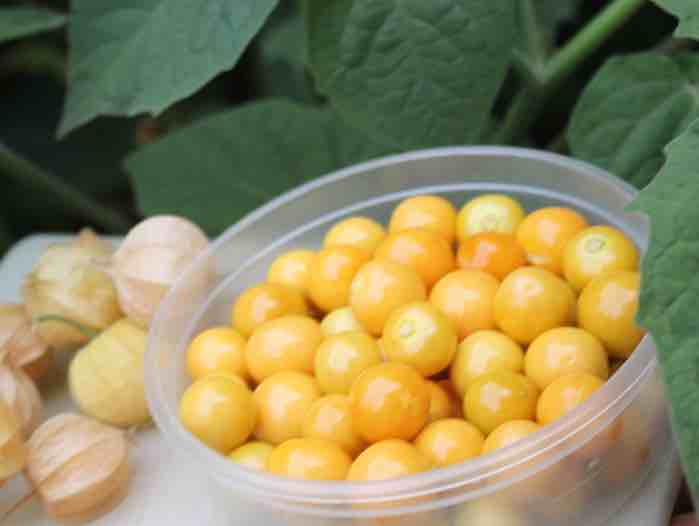 Fresh fruit is easy to grow
Fresh fruit is easy to growSodium in processed foods
Others are calling for legislation to reduce the sodium in processed foods. Universally commercial breads, pizzas and canned soups for example have very high levels of salt.
Many find that draconian and unenforceable in any case; and our ultra-processed food without neither its natural flavouring nor salt would be very bland.
Great-grandmother's cooking
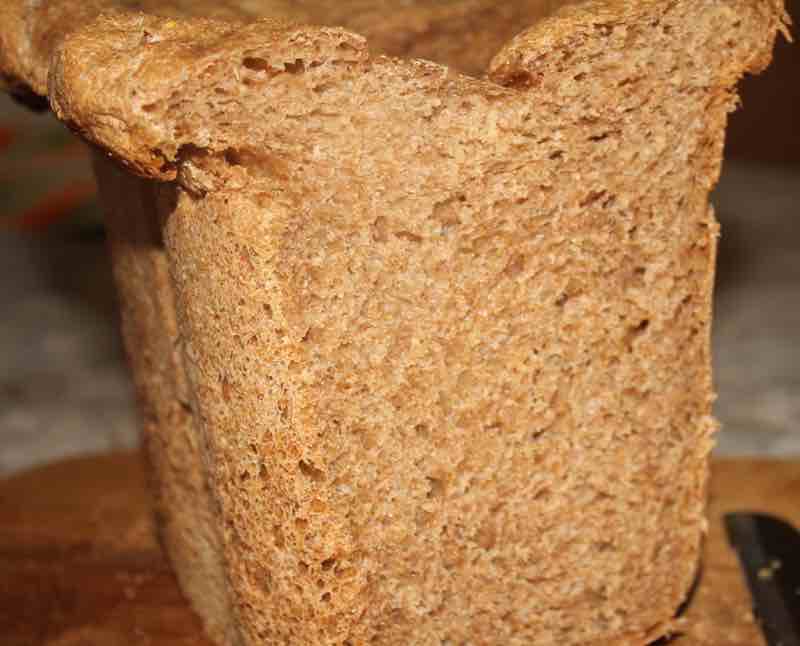 Wholemeal sourdough bread
Wholemeal sourdough bread"Let thy food be thy medicine; and medicine they food."
Hippocrates (460 - 370 BC)
Being a disciple of Hippocrates compels me to recommend returning to the good food that our great-grandmothers once put before us, unpalatable though that concept may be. Is it practical and doable?
Or have we moved so far from our roots that suggesting we start growing and preparing our own meals again simply cannot and will not be done?
That's what the Blue Zone people do; grow and prepare much of their own food. There are many plusses.
- Out of doors we are exposed to more sunlight; a vitamin D deficiency will no longer be a problem.
- Digging in the garden, preparing compost heaps and using the wheelbarrow are all good exercise. We can cancel our gym contracts.
- A quiet walk in the garden perhaps simply to admire your handiwork and nature at work is very relaxing; it's akin to what is being called forest bathing.
- Fresh vegetables from the garden are so much tastier.
- Fresh fruit all year round from the garden is feasible in many climes; and virtually free.
- The salt versus potassium blood pressure debate can be relegated to where it belongs; on the scrap heap.
Investing in long term health may seem like a "bridge too far." And spending more time in the kitchen once again preparing food that is naturally low in sodium and high in potassium impossible. Then we are faced with anti-hypertensive medication with all its side effects; and bucket loads of supplements.
The salt versus potassium blood pressure debate is all set to continue for those unwilling to amend their ways.
"There is increasing evidence that exposure to plants and green space, and particularly to gardening is beneficial to mental and physical health."
- Clinical Medicine (PMC6334070)[2]
Potatoes
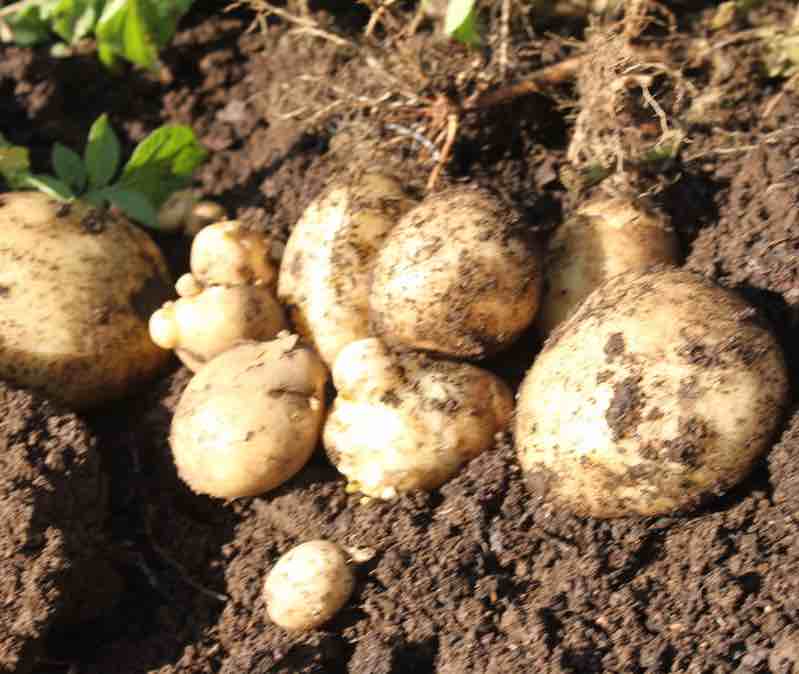 New potatoes are rich in potassium; and much less fattening.
New potatoes are rich in potassium; and much less fattening.There are conflicting opinions on potatoes but a great virtue is that just one medium-sized spud contains 20% of the daily recommended allowance of potassium; if you don't peel it and use the water it was cooked in for making a soup or gravy.
Alas potatoes from cold storage are not to be recommended especially if baked or eaten as french fries; the GI is very high and they certainly contribute to the growing insulin-resistance pandemic.
For the home gardener though new potatoes are gems; they have far more "resistant starch" which goes to feed the bugs in the colon instead of being turned into glucose. Nor do they need to be peeled; and because of all that potassium they will certainly contribute to lower blood-pressure.
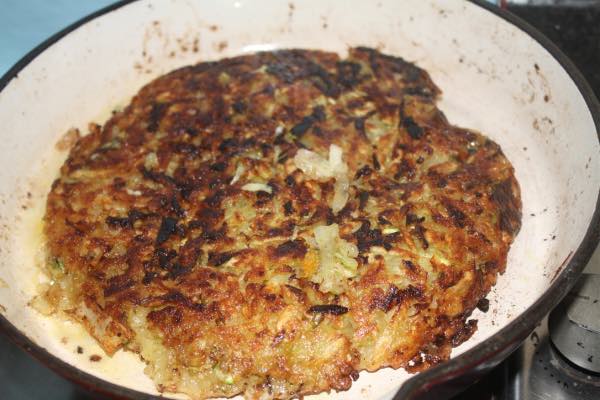
Isometric exercises for lowering blood pressure
Astonishing research that two simple isometric exercises for the quadriceps muscles[2] will lower both measurements of blood pressure by 6 to 10 points; enough for some people to go off medication.
Use about 80% of your leg power and hold for 45 seconds.
These knee exercises are not an alternative to the salt versus potassium blood pressure debate; coupled with a return to fresh fruit and vegetables many nonsmokers could get off anti-hypertensive medication.
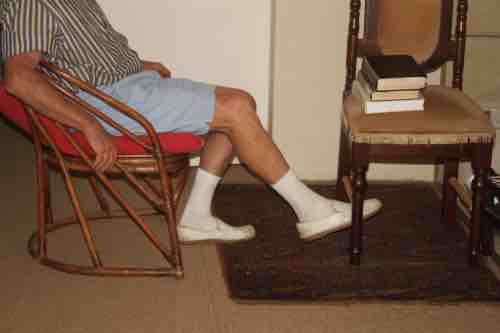 Extend the knee against the weight of the chair
Extend the knee against the weight of the chair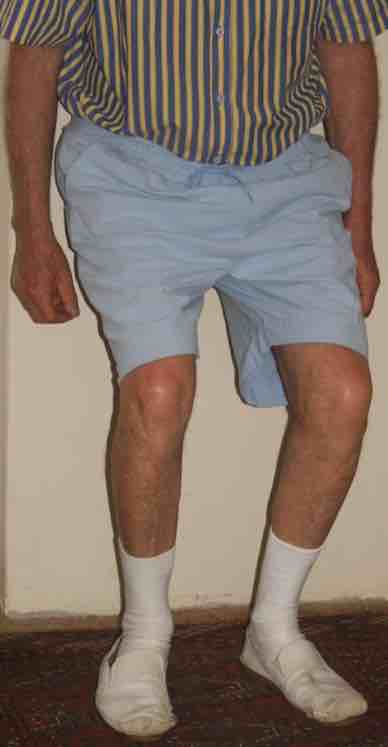 Not too deep
Not too deepIt's no coincidence that the only unique feature that characterises the people of the mountainous parts of Sardinia is the need to use stairs daily; and walk up and down steep slopes. They have strong quadriceps muscles, lowering blood pressure and ensuring they live to a strong and vigorous ninety. There are no old age homes. They are true Blue Zone folk.
Strong research confirms that strengthening thigh muscles also increases bone mineral density in the hips delaying the onset of falls, fractures and frailty[4].
Fatty pancreas
"Fatty Pancreas" is a serious disease resulting in severe abdominal pain and a doubling of the risk of cancer. Hypertension is one of the underlying causes; as is a diet high in refined carbs and salt.
Researchers even claim that new potatoes are anti-cancer; and reduce obesity and diabetes. They contain significant amounts of beta carotene, lutein and zeaxanthin that protect the eyes against childhood blindness and adult onset macular degeneration[3].
Eat more new potatoes; better still grow them yourself. Keep the load down if you are obese; small helpings.
When browsing use right click and "Open Link in New Tab" or you may get a bad gateway signal.
Newsletter
Our newsletter is entitled "create a cyan zone" at your home, preserving both yourself and Mother Earth for future generations; and the family too, of course. We promise not to spam you with daily emails promoting various products. You may get an occasional nudge to buy one of my books.
Here are the back issues.
- Lifestyle and ideal body weight
- What are ultra-processed foods?
- Investing in long-term health
- Diseases from plastic exposure
- Intensive lifestyle management for obesity has limited value
- A world largely devoid of Parkinson's Disease
- The impact of friendly bacteria in the tum on the prevention of cancer
- There's a hole in the bucket
- Everyone is talking about weight loss drugs
- Pull the sweet tooth
- If you suffer from heartburn plant a susu
- Refined maize meal and stunting
- Should agriculture and industry get priority for water and electricity?
- Nature is calling
- Mill your own flour
- Bake your own sourdough bread
- Microplastics from our water
- Alternative types of water storage
- Wear your clothes out
- Comfort foods
- Create a bee-friendly environment
- Go to bed slightly hungry
- Keep bees
- Blue zone folk are religious
- Reduce plastic waste
- Family is important
- What can go in compost?
- Grow broad beans for longevity
- Harvest and store sunshine
- Blue zone exercise
- Harvest and store your rainwater
- Create a cyan zone at your home
Did you find this page interesting? How about forwarding it to a friendly book or food junkie? Better still, a social media tick would help.
Address:
56 Groenekloof Rd,
Hilton, KZN
South Africa
Website:
https://www.bernard-preston.com